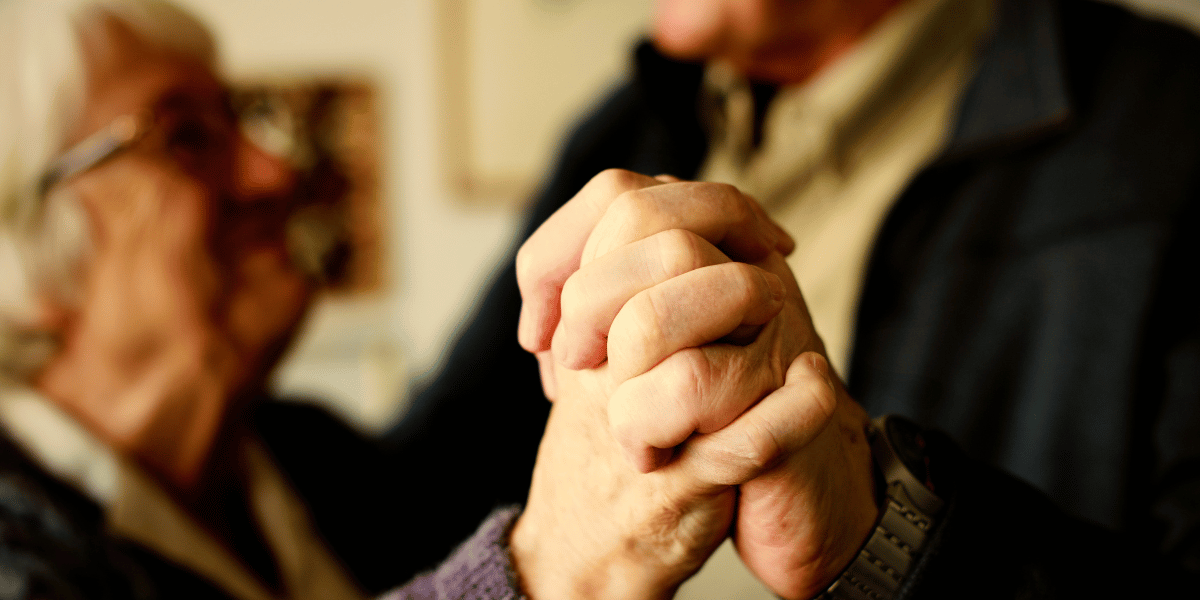HOPE at HOME
HOPE at Home: Compassionate Hospice Care When and Where It Matters Most. We greet you at your front door. At HOPE...
4 min read
HOPE Healthcare and Hospice
Feb 13, 2023 3:40:27 PM

As those we love age, increased and more complex health conditions become more common. Recognizing the signs that your loved one is experiencing serious physical and/or cognitive decline can be crucial to beginning the care they qualify for and deserve. Initiating hospice care earlier rather than later for terminal illnesses ensures your loved one and family receive the full hospice benefit. This blog post will discuss signs that it may be time for hospice care and how HOPE Healthcare and Hospice help those in need.
Families with a loved one facing a terminal illness are often overcome with a flurry of decisions to make quickly. Among these decisions is the choice of hospice care; hospice care should be considered as early as possible for the best outcomes for patients and families. When a loved one is eligible, the specialized care related to their terminal illness can begin months before the final days or weeks.
According to experts, relying on hospice care sooner rather than later can reduce symptoms and stress for the patient and their family during a difficult period, providing months of meaningful care, memorable moments, and quality time with those that matter most. Additionally, when symptoms, such as pain, are effectively controlled, patients not only feel better, but they have the potential to live out the rest of their days happier and in the comforts of their own homes. Hospice is specialized healthcare carried out by an Interdisciplinary team. Upon admission to hospice care, the patient receives the necessary medical equipment, medication, and supplies; this is all arranged at the convenience of patients and families. Hospice care is intended to allow the patients and families to remain in control; hospice provides guidance, support, and symptom management.
Starting the conversation can feel daunting, but taking more proactive steps whenever possible allows families to better cope with the unknowns of their loved one’s condition.
These are a few tips we suggest to help start the hospice conversation:
At HOPE Healthcare and Hospice, we often hear, "I wish we would have called hospice sooner." When the level of support and care we provide is realized, the patient and family can begin to live fully and with less worry. This is why we say, "Let HOPE add life to your days."
It is essential to be cognizant of the declining health of our loved ones as they age and/or as their terminal disease process advances. This is especially important regarding end-of-life care; if you are ever tasked with making decisions, you want to be as prepared as possible. Attention to noteworthy changes can help everyone involved understand and make the best decision for themselves and their loved ones.
Although it is hard to think about losing a loved one, monitoring their changing condition can help honor any previous end-of-life decisions. If any of the following signs are present, it may be time to consider the benefits of hospice care.
When treatments for a loved one's terminal illness are no longer working, it is time to consider hospice care. Hospice care provides comfort and dignity during the final days of life, as well as medication, specialized medical equipment, and supplies for eligible people. Hospice care provides symptom management for the patient and emotional and spiritual support for the patient and their family during this difficult time.
If your loved one is experiencing uncontrolled symptoms due to a terminal illness, it may be time to consider the benefits of hospice care. The HOPE Hospice care team has special training for symptom management with years of experience.
As seniors age, they are increasingly at risk of requiring regular medical attention. Going to the emergency department more frequently could indicate declining health for elderly individuals with complex medical needs, and hospice care could be considered.
As hospice-appropriate diagnoses progress, the experience of confusion and agitation often arise as symptoms. Some patients might encounter more obvious confusion, like the inability to recognize who is sitting next to them or not remembering the purpose of a restroom; some patients may experience more subtle forms, like trying to put something where it does not belong. All levels of confusion can be very upsetting for patients and families.
Your aging loved ones may face difficulties that can impede activities of daily living. These ailments can lead down isolating paths. Decreased mobility or vision loss may interfere with the connection of loved ones and the ability to recognize what should be familiar faces in a room. Advancing Alzheimer's and dementia can also cause similar symptoms. Signs of social withdrawal combined with a terminal diagnosis can indicate that hospice care should be considered.
Monitoring your loved one's diet can be crucial in identifying issues with their digestion or explaining drops in energy levels. A patient who is continuously uninterested in eating could signify an inability to process food properly and/or the body beginning to shut down as part of the natural dying process. Hospice care teams are specially trained to help the family differentiate the possible causes and provide guidance during this difficult time.
As life draws nearer to its end, people naturally start sleeping more and may even spend most of their day in a chair or bed. This fatigue can indicate that hospice care could begin providing comfort for the individual’s final journey.
As the disease progresses, more frequent infections such as pneumonia and sepsis may become common - an indication of diminishing health. Urinary tract and/or skin infections may also appear with increasing regularity, foreshadowing further complications. If any of these signs and symptoms are present more frequently, it might be time to look into hospice care for your loved one. You can give them the gift of being surrounded by caring, compassionate healthcare professionals with experience managing this process.
Caring for someone you love takes courage and strength. However, being the primary caregiver can often cause additional stress. If feelings of exhaustion begin to feel consuming, it is important to ask for help to prevent caregiver fatigue, which can lead to other issues if not addressed.
At HOPE Healthcare and Hospice, we want caregivers to feel free to reach out for help. As such, we have compiled caregiver resources here in addition to the Hospice services offered. Although hospice may not alleviate all situations, it can provide assistance for both patients and families.
HOPE Healthcare and Hospice provides the highest quality care for individuals and families facing end-of-life situations. We consider each individual’s unique needs by offering an array of services that can be tailored specifically to the patient and their family.
Our experienced hospice care team is available to provide emotional, spiritual, and physical support throughout the journey, including medication delivery, medical equipment and supplies, end-of-life resources, and grief support when needed.
No one should have to go through the end-of-life process; that’s why HOPE Healthcare and Hospice exists. Our mission is simple—to bring comfort and dignity into the lives of those who need special assistance at this challenging time.
If you or someone you know is showing any signs listed above that may indicate it’s time for hospice care, reach out and contact us today! We are here to help you every step of the way.

HOPE at Home: Compassionate Hospice Care When and Where It Matters Most. We greet you at your front door. At HOPE...

Navigating the Five Stages of Grief Losing a loved one is a deeply personal journey, and understanding the five stages of grief—denial, anger,...

At HOPE Healthcare and Hospice, we recognize the powerful and positive effects music can have on hospice patients and families during difficult...